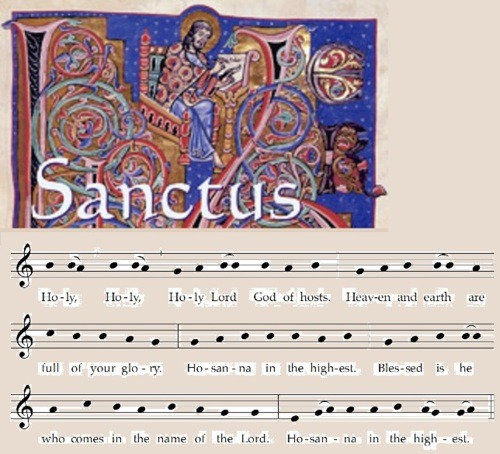Undoubtedly most folks using Divine Service 1 and 2 of LSB or the services of ELW will have grown accustomed to the phrase, Holy, holy, holy Lord, God of power and might... But it has not worn so well, at least in my mind. The translation of the Sanctus was a nod to the ICEL and our attempt to be ecumenical. We went along with the rest of the liturgical crowd in an attempt to render Hebrew into mundane English.
It does not take much familiarity with Scripture to figure out where the original came from. Sanctus Sanctus Sanctus Domine Deus Sabaoth (Heilig, heilig, heilig, Herr Gott Zabaoth) pulls together Isaiah 6 since about the 5th century. The Greek text in Revelation 4 has παντοκρατωρ (pantokrator)instead of Σαβαώθ (Sabaoth). Pantokrator does mean “powerful over all.”
He is YHWH God SBAOTH. The Vulgate puts it rather awkwardly as 'God of armies,' referencing the great warrior tradition of the God who vanquished the enemies of His people Israel. Of course, armies will not work today without hesitation about things military and all. So I can well understand the problem addressed by the ICEL. Nevertheless, their solution has not worn well, I think. I am not sure how to render the image of God and His armies in a way that does not step on modern sensitivities but I do think the Lord deserves something more.
'Holy, holy, holy Lord, God of power and might'. So if we cannot render it "armies," what might replace power and might? I wonder if Rome has not picked the right word. In the newer English translation of the Mass, the phrase power and might was replaced with God of hosts. Now I will admit that this is a rather ancient term and somewhat in need of unpacking but that the very reason I am drawn to it. It is not mundane but somewhat of a mystery. Hosts does mean armies, after all, and it we cannot use the original Sabaoth or the more literal armies, maybe hosts is a fitting compromise. We Lutherans seem intent upon following Rome's lead in liturgical reform. It remains to be seen if we will follow this one.
My own preference would have been to retain the original and leave the Hebrew term alone -- Sabaoth.
We Lutherans have a history of that term until 1978 and LBW and 1982 and LW, but we have restored Divine Service 3 without much alteration -- none in the ordinary, at least. So why not simply let it be?

3 comments:
God of never-resting angels?
"Hosts" does have a long heritage and is the translation of the 1549 Book of Common Prayer
Keep it Sabaoth but make sure you pronounce it correctly.
Post a Comment